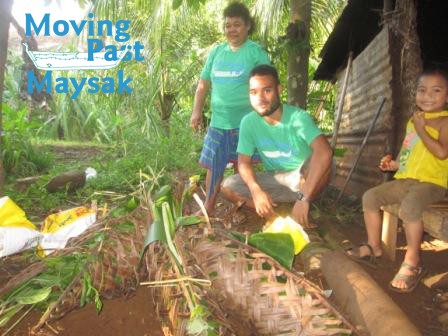ElatoEuripikFaraulepIfalikLamotrekMaysakMicronesiaMoving Past MaysakOuter IslandsPiikSatawalTyphoonUlithiWoleaiYap
Traditional, Sustainable Food after Maysak Destruction
Micronesia's remote Outer Islands were fortunate enough to receive emergency supplies of food and water immediately after the destruction of Typhoon Maysak. These rations are crucial for short term survival, but the need to revive traditional, sustainable food sources is an ongoing need.
Volunteers with Waa'gey - a Habele partner organization - have jumped in to help bolster relief work with a long-term food solution for some of Yap State's most isolated Outer Islands.
Drawing on traditional and local knowledge of storm relief, Waa'gey volunteers collected over fifty baskets of traditional crop seedlings, which they will personally deliver to the atolls of Faraulep and Piik. Inside the baskets are over 500 plants, including taro, banana, tapioca, sweet potatoes and even mahogany trees. These are familiar crops, identified by islanders as the most targeted means of helping remote communities regain self-sufficiency.
Faraulep and Piik lie almost 500 miles east of Yap, and suffered 80% loss of food crops and infrastructure to Typhoon Maysak. The majority of this damage was directly from shoreline inundation. Islands and atolls even further east - Satawal, Lamotrek, Elato, Ifalik, Woleai, and Euripik - were fortunate to have avoided the worst of the storm, and sustained considerably less damage.
Faraulep and Piik lie almost 500 miles east of Yap, and suffered 80% loss of food crops and infrastructure to Typhoon Maysak. The majority of this damage was directly from shoreline inundation. Islands and atolls even further east - Satawal, Lamotrek, Elato, Ifalik, Woleai, and Euripik - were fortunate to have avoided the worst of the storm, and sustained considerably less damage.
In addition to delivering plants to the island communities, Waa'gey volunteers will be lending their backs and chainsaws to clearing away the wreckage and debris. Many of these remote islands are confined to the use of the only limited hand tools, as chainsaws simply aren't available. Without the chainsaws and additional manpower, the task of clearing space to plant traditional food plots would be extremely daunting.
or send check or money order to Habele, 701 Gervais St, STE 150-244, Columbia, SC 29201.
Habele is a tax exempt, all-volunteer, US based nonprofit with a proud history of high impact support for our partners in Micronesia.
Share









0 comments